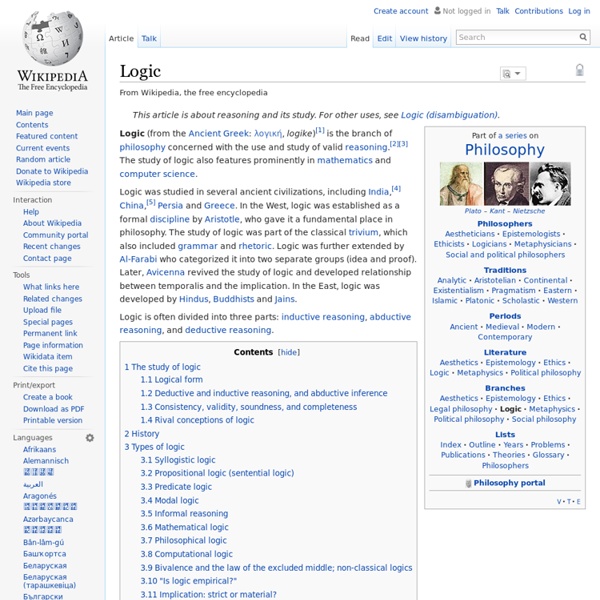Logic
Logic (from the Ancient Greek: λογική, logike)[1] is the branch of philosophy concerned with the use and study of valid reasoning.[2][3] The study of logic also features prominently in mathematics and computer science. Logic is often divided into three parts: inductive reasoning, abductive reasoning, and deductive reasoning. The study of logic[edit] The concept of logical form is central to logic, it being held that the validity of an argument is determined by its logical form, not by its content. Traditional Aristotelian syllogistic logic and modern symbolic logic are examples of formal logics. Informal logic is the study of natural language arguments. Logical form[edit] Main article: Logical form Logic is generally considered formal when it analyzes and represents the form of any valid argument type. This is called showing the logical form of the argument. Second, certain parts of the sentence must be replaced with schematic letters. from an observed surprising circumstance from
http://en.wikipedia.org/wiki/Logic
Related: The problems with philosophy
Module: Basic logic
The term "logic" is often used in many different ways. It is sometimes understood broadly as the systematic study of the principles of good reasoning. As such logic is not very different from critical thinking. But sometimes "logic" is understood more narrowly as what we might call "deductive logic". Roughly speaking, deductive logic is mainly about the consistency of statements and beliefs, as well as the validity of arguments. These are the topics we shall investigate in the following modules.
Not even wrong
Not even wrong refers to any statement, argument or explanation that can be neither correct nor incorrect, because it fails to meet the criteria by which correctness and incorrectness are determined. As a more formal fallacy, it refers to the fine art of generating an ostensibly "correct" conclusion, but from premises known to be wrong or inapplicable. The phrase implies that not only is someone not making a valid point in a discussion, but they don't even understand the nature of the discussion itself, or the things that need to be understood in order to participate. [edit] Origin The phrase apparently originates with physicist Wolfgang Pauli, who used the phrase (in the form "Das ist nicht nur nicht richtig, es ist nicht einmal falsch!" — "That is not only not right, it is not even wrong!")
Critical Thinking: What is the Fallacy of Appeal to Ignorance?
Part of critical thinking is learning to recognize-and avoid falling prey to-common logical fallacies. One of these fallacies is called appeal to ignorance . And no, appeal to ignorance isn't an accusation that a person putting forth a certain argument is "ignorant." It's not just a bit of name calling. An appeal to ignorance is an argument form whereby the only grounds offered for accepting a certain claim are that there are insufficient reasons to disbelieve it.
Argument from ignorance
Argument from ignorance (Latin: argumentum ad ignorantiam), also known as appeal to ignorance (in which ignorance stands for "lack of evidence to the contrary"), is a fallacy in informal logic. It asserts that a proposition is true because it has not yet been proven false (or vice versa). This represents a type of false dichotomy in that it excludes a third option, which is that there is insufficient investigation and therefore insufficient information to prove the proposition satisfactorily to be either true or false. Nor does it allow the admission that the choices may in fact not be two (true or false), but may be as many as four,
Moving the Goal Posts
(also known as: gravity game, raising the bar, argument by demanding impossible perfection [form of]) Description: Demanding from an opponent that he or she address more and more points, after the initial counter-argument has been satisfied, refusing to conceded or accept the opponent’s argument. Logical Form: Issue A has been raised, and adequately answered. Issue B is then raised, and adequately answered.
Related:



